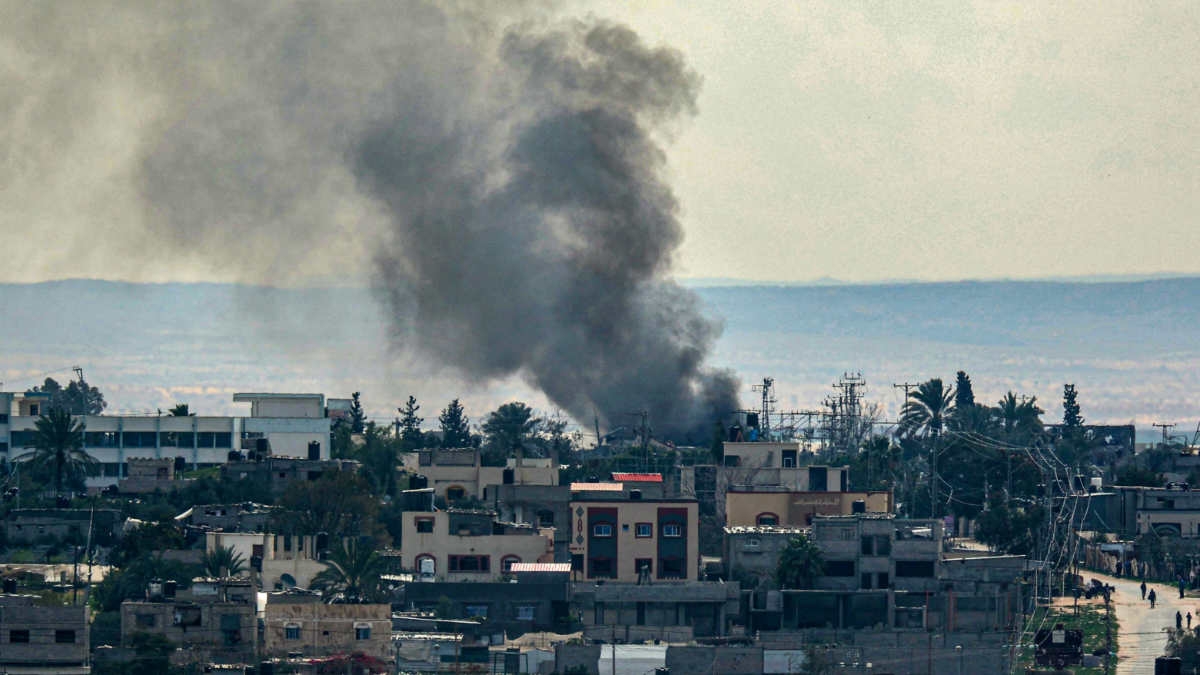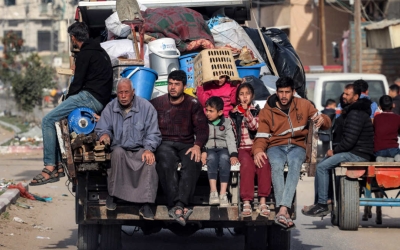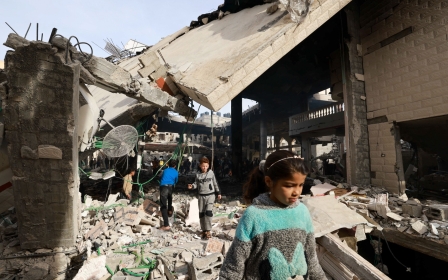Biden pushes Congress to approve $14bn for Israel as UN warns of 'slaughter' in Rafah

US President Joe Biden urged the House of Representatives to pass a $95bn national security funding bill that includes billions in military aid to Israel, underlining the US administration’s continued belief in unconditional military backing for Israel despite tensions over a looming invasion of Rafah in Gaza.
Hours after the Senate finally approved security funding for Ukraine, Taiwan and Israel, on Tuesday Biden challenged the House of Representatives to "move on this with urgency”.
The bulk of the bill provides $60bn in military aid to Ukraine, whose stock of ammunition supplies is rapidly dwindling. But it also sets aside $14bn in aid to Israel which Biden in a statement said, “will provide Israel with what it needs to protect its people against Hamas terrorists”.
The bill would provide an additional $10.6bn in military assistance to Israel in addition to the $3.5bn in foreign military financing it regularly receives.
While it earmarks $1.6bn in humanitarian assistance for Palestinians in Gaza, it specifically prohibits funds from going to the UN Agency for Palestinian Relief (Unrwa), in response to Israeli allegations that members of the agency have ties to Hamas.
The bill passed the Senate by a vote of 70 to 29.
Three Democrats, Bernie Sanders, Jeff Merkley and Peter Welch, voted "no" in response to Israel’s conduct in Gaza. But resistance to the bill came mainly from Republican lawmakers who opposed it with the backing of former President Donald Trump, amid a spat with Democrats over immigration.
The bill is unlikely to become law anytime soon because Republican Speaker of the House Mike Johnson has indicated he will not allow it to come to a vote in the lower chamber in response to Trump’s plea.
Biden’s statement on Tuesday, urging the House to pass the bill, included just two lines on Israel. Despite publicly rebuking Israel for what the US President labelled an “over the top” military response to the Hamas-led 7 October attack which sparked the war, his administration has shown no willingness to cut its military funding.
'Tethered to Israel'
The bill's passage in the Senate comes at a critical juncture in the war.
On Tuesday, CIA director Bill Burns met Israeli Mossad chief David Barnea, Egyptian intelligence chief Abbas Kamel and Qatari Prime Minister Sheikh Mohammed bin Abdulrahman al-Thani in Cairo, according to the Wall Street Journal.
Burns, the Biden administration's top troubleshooter, is pushing for a prisoner exchange between Hamas and Israel that would pause the fighting in Gaza and create space for what the administration hopes will be a permanent ceasefire, former US officials told Middle East Eye previously.
At the same time, thousands of Palestinians already displaced by the war are streaming out of Rafah amid fears of a looming Israeli invasion of the border city, whose population has swelled to 1.4 million with people seeking refuge from Israeli bombardment.
On Tuesday, UN humanitarian chief Martin Griffiths warned Israel's planned military push into the southern city "could lead to a slaughter" of Palestinians.
But an Israeli assault would also reverberate outside the besieged enclave, with experts telling MEE that Palestinians may flock to Egypt’s Sinai peninsula to escape the offensive, a development that could spark a political firestorm in Cairo, a key US ally and Israeli peace partner.
In a meeting on Monday with Jordan's King Abdullah II at the White House, Biden reaffirmed his opposition to forced displacement, saying Palestinians in Rafah needed to be "protected". He looked on as the Jordanian monarch, a key US ally, issued a stark warning from the White House podium.
“We cannot afford an Israeli attack on Rafah. It is certain to produce another humanitarian catastrophe," he said.
But Washington has moved from fully opposing an Israeli offensive in Rafah to saying that Israel first needs to come up with a plan to protect Palestinian civilians before attacking.
The Biden administration is unlikely to risk a full-blown rift with Israel over Rafah because it wants its cooperation to strike a hostage deal, Aaron David Miller, a former US Middle East negotiator now at the Carnegie Endowment for International Peace, told MEE.
“They (the Biden Administration) are so tethered to the Israeli war that creating an open breach with Netanyahu will leave them with no policy,” Miller said.
“Rafah is not the fulcrum from which US policy on Israel and Hamas is going to be waged. They want a hostage deal. You can hang a 'closed for the season' sign if the US doesn’t get that done.”
The looming Israeli assault comes as some of Washington’s closest western allies have started to criticise its military aid to Israel. On Monday, European Union foreign policy chief Josep Borrell asked why the US was continuing to provide arms to Israel “if you believe that too many people are being killed”.
The bill’s passage in the Senate also underscored how criticism of Israel has taken a back seat to US lawmakers' concerns over Ukraine and Taiwan. US Senator Chris Van Hollen, one of Israel’s harshest critics in the Senate, voted for the bill the same day he accused it of conducting “a textbook war crime” in Gaza.
Middle East Eye propose une couverture et une analyse indépendantes et incomparables du Moyen-Orient, de l’Afrique du Nord et d’autres régions du monde. Pour en savoir plus sur la reprise de ce contenu et les frais qui s’appliquent, veuillez remplir ce formulaire [en anglais]. Pour en savoir plus sur MEE, cliquez ici [en anglais].





